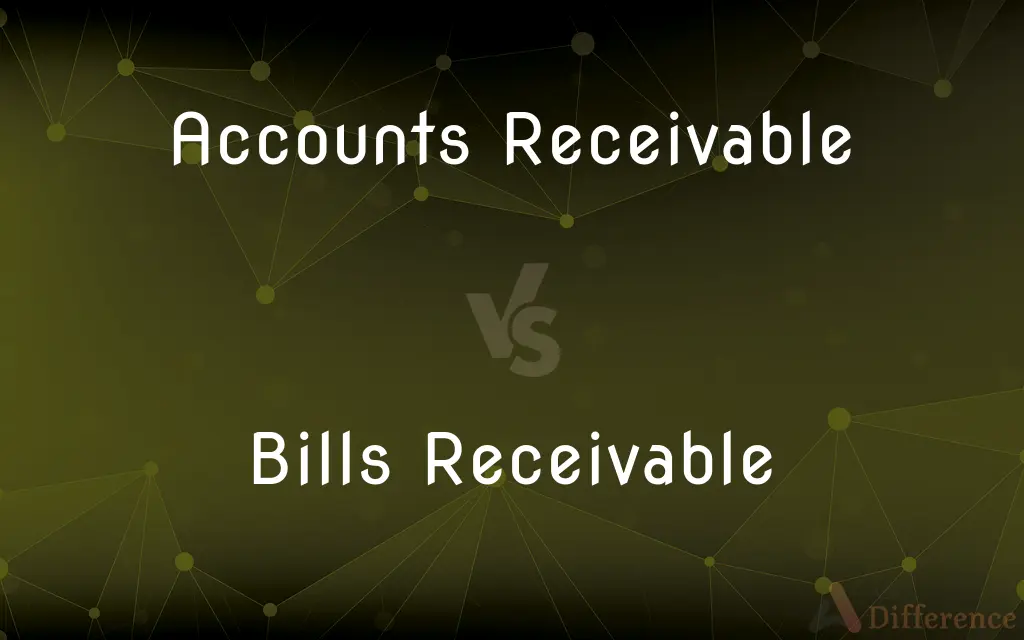Accounts Receivable vs. Bills Receivable — What's the Difference?
By Tayyaba Rehman — Published on October 8, 2023
Accounts Receivable refers to the amounts owed to a company by its customers, while Bills Receivable involves amounts owed according to specific, legally binding promissory notes.

Difference Between Accounts Receivable and Bills Receivable
Table of Contents
ADVERTISEMENT
Key Differences
In dealing with Accounts Receivable, businesses are extending credit to customers following a purchase, underlining a general agreement that payment will be made in the future. While it fosters customer trust and potential for increased sales, AR does lack the formal, legally binding documentation inherent in Bills Receivable, which is noted for explicitly specifying payment terms and conditions.
Tayyaba Rehman
Oct 08, 2023
Speaking of duration and maturity, Accounts Receivable usually pertains to shorter durations, often aligning with standard industry credit terms. Bills Receivable, however, can encompass varied durations, with the payment terms being explicitly stated and agreed upon within the bill, potentially allowing for longer, more flexible credit periods.
Tayyaba Rehman
Oct 08, 2023
Accounts Receivable (AR) essentially represents the credit sales of a business, where goods or services are sold without immediate payment, thus creating a debtor-creditor relationship. In contrast, Bills Receivable (BR) typically involves specific documentation, namely a bill of exchange, which is a written, unconditional order directing a party to pay a definite sum of money to another.
Tayyaba Rehman
Oct 08, 2023
Elaborating on Bills Receivable, this involves an instrument (the bill of exchange) where the drawer outlines clear payment terms and the drawee accepts these terms, becoming legally bound to make payment by a specified date. Conversely, Accounts Receivable does not necessitate such formal acceptance or clear, documented terms, operating more on goodwill and industry norms.
Tayyaba Rehman
Oct 08, 2023
Delving into the risk and assurance aspect, Accounts Receivable might carry more risk due to its lack of concrete, enforceable documentation, potentially complicating legal recourse in the event of non-payment. Bills Receivable, with its formalized terms and explicit acceptance, can typically be used as a more reliable tool in securing payment and can even be negotiated, providing enhanced liquidity to the holder.
Tayyaba Rehman
Oct 08, 2023
ADVERTISEMENT
Comparison Chart
Payment Terms Specificity
Often standard industry terms
Clearly specified within the document
Tayyaba Rehman
Oct 08, 2023
ADVERTISEMENT
Definitions
Accounts Receivable
Money owed to a company by its debtors.
The firm’s Accounts Receivable increased this quarter, indicating higher credit sales.
Tayyaba Rehman
Oct 03, 2023
Bills Receivable
A written order binding one party to pay a fixed sum to another by a predetermined date.
Bills Receivable were sold to the bank to manage short-term liquidity needs.
Tayyaba Rehman
Oct 03, 2023
Accounts Receivable
Asset account representing amounts owed by clients.
Accounts Receivable were listed on the balance sheet under current assets.
Tayyaba Rehman
Oct 03, 2023
Bills Receivable
An accepted bill of exchange to be received and paid for by a business.
By negotiating Bills Receivable, the company enhanced its working capital.
Tayyaba Rehman
Oct 03, 2023
Accounts Receivable
Sums of money to be received by a business from customers.
To boost cash flow, the manager aimed to reduce Accounts Receivable.
Tayyaba Rehman
Oct 03, 2023
Bills Receivable
Financial document signaling a debtor’s promise to pay a certain sum.
Bills Receivable are legally binding documents ensuring payment.
Tayyaba Rehman
Oct 03, 2023
Accounts Receivable
Outstanding invoices a company has or the money clients owe the company.
The company utilized software to track its Accounts Receivable efficiently.
Tayyaba Rehman
Oct 03, 2023
Bills Receivable
Document representing a promise of payment from a customer to a business.
Her ledger kept a meticulous record of all the Bills Receivable.
Tayyaba Rehman
Oct 03, 2023
Accounts Receivable
Amounts due from customers for credit sales.
They hired an accountant to manage the growing Accounts Receivable.
Tayyaba Rehman
Oct 03, 2023
Bills Receivable
Legally enforceable claim against an amount due under the terms of a bill of exchange.
He tallied the Bills Receivable to predict the incoming cash flow accurately.
Tayyaba Rehman
Oct 03, 2023
FAQs
Is Bills Receivable a legally binding document?
Yes, Bills Receivable involves a bill of exchange, which is legally binding.
Tayyaba Rehman
Oct 08, 2023
What financial statement includes Accounts Receivable?
Accounts Receivable is included in the balance sheet under current assets.
Tayyaba Rehman
Oct 08, 2023
How are Accounts Receivable typically documented?
Accounts Receivable may not involve formal documents and operate based on credit terms.
Tayyaba Rehman
Oct 08, 2023
Can Bills Receivable be transferred?
Yes, Bills Receivable can be endorsed and transferred to another party.
Tayyaba Rehman
Oct 08, 2023
Can Bills Receivable be used for trade financing?
Yes, Bills Receivable can be used for trade financing due to its negotiability.
Tayyaba Rehman
Oct 08, 2023
What constitutes Accounts Receivable?
Accounts Receivable represents amounts owed to a business by customers from credit sales.
Tayyaba Rehman
Oct 08, 2023
Are Bills Receivable always related to credit sales?
Generally, yes. Bills Receivable often originate from credit sales or transactions.
Tayyaba Rehman
Oct 08, 2023
How can businesses manage Accounts Receivable effectively?
Businesses manage Accounts Receivable by establishing clear credit policies and active tracking.
Tayyaba Rehman
Oct 08, 2023
Is interest charged on overdue Accounts Receivable?
Interest on overdue Accounts Receivable can be charged based on agreement or policy.
Tayyaba Rehman
Oct 08, 2023
Author Spotlight
Written by
Tayyaba RehmanTayyaba Rehman is a distinguished writer, currently serving as a primary contributor to askdifference.com. As a researcher in semantics and etymology, Tayyaba's passion for the complexity of languages and their distinctions has found a perfect home on the platform. Tayyaba delves into the intricacies of language, distinguishing between commonly confused words and phrases, thereby providing clarity for readers worldwide.

















































